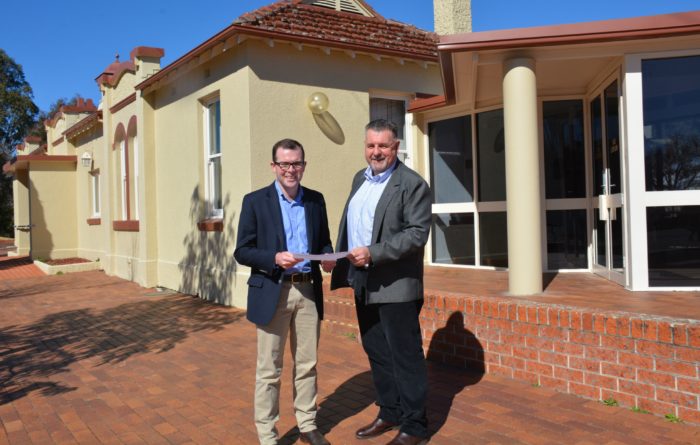
Member for Northern Tablelands Adam Marshall, left, launching the $150,000 Virtuous Circle initiative with Uralla Shire Council Mayor Michael Pearce.
Wednesday, 16 August 2017
BUSINESS at Uralla Shire Council is about to get better, faster and simpler with the introduction of an entirely new way of approaching customer service, thanks to support from the NSW Government.
Over the coming weeks, council staff at the Salisbury Street office will be trained in the ‘Virtuous Circle’ business philosophy – the assertion that good practices improve the quality of work, which improves ratepayer satisfaction, which in turn, improves practice – each action looping back around into a circle.
Member for Northern Tablelands Adam Marshall today announced $150,000 from the NSW Innovation Fund for the program, which he said a NSW Innovation Fund grant of would deliver tremendous results to Uralla Shire ratepayers.
“Ratepayers are entitled to expect good performance and service from their councils, and creative approaches to business can help achieve those goals,” Mr Marshall said.
“The Virtuous Circle philosophy is a new way of running a successful organisation, rapidly being used by companies, charities and community groups across the world.
“It states that through making constant small improvements in every element of council’s work, the benefits seen by ratepayers will be much bigger than the sum of its parts.
Mr Marshall said the funding would also be used to upgrade computer technology and software, streamline financial management practices and improve staff performance.
“Each upgrade will help contribute to a faster, more efficient and modern Uralla Shire Council,” Mr Marshall said.
“The best demonstration of the Virtuous Circle will be in the improved customer service seen by Uralla Shire locals – and I hope that this successful program may be used as a blueprint for improving local government across the state.”
Uralla Shire Council General Manager Andrew Hopkins said his previous experience with Virtuous Circle in the private sector had shown its potential.
“Council will have greater capacity for continuous improvement and service delivery innovation,” Mr Hopkins said.
“This will lead to increased staff productivity for optimum levels of service, and those efficiency gains will be reinvested into projects that require resources.
“The project will be driving innovation and change by using a combination of new cloud based technology, a supporting program of staff education and the development of an organisational culture of continuous improvement.”